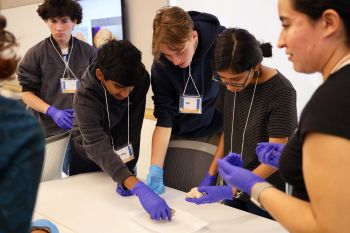We all want to feel like we matter. But mattering becomes especially important during our adolescent years. Hormonal changes associated with puberty make us more sensitive to social evaluation. We tend to become more self-conscious and easily humiliated, but also thrilled by social success. It’s not simply about being popular, it’s about feeling valued and finding ways to earn prestige or admiration. One positive way to feel valued is by contributing, in meaningful ways, to family, friends, the community, or the world.
At a panel discussion at UC Berkeley’s Institute for Human Development (IHD) on Monday, IHD Director Ron Dahl, MD (host of our Adaptivity podcast), talked with our Co-Executive Director Andrew Fuligni, PhD, and Cornell professor Anthony Burrow, PhD, about the kinds of contributions that feed the hunger to matter during adolescence.
Dr. Fuligni described some key features of meaningful contributions:
- Contributions should be authentic and have a real impact. “Adolescents have ‘bullsh** detectors’ that are 2 feet high,” said Dr. Fuligni. They know when a task is busywork. Their efforts need to make an actual difference to those around them.
- Youth need to have some agency in the contributions they make. Simply handing them a list of chores to do without giving them a say isn’t enough. Young people need a chance to make some part of the task their own, by choosing the activity or approaching it their own way.
- The activity should be challenging but meaningful. The key thing is to scaffold the challenge so it’s individually and developmentally appropriate to them. That means different activities for younger adolescents than for those in high school or college.
- Their contribution has to be acknowledged. Not constant praise, which starts to feel condescending, but some acknowledgment of their role in the group by an occasional “thank you,” a nod, a note, or recognition at an end-of-year event.
In addition, the simple act of asking a young person about their sense of purpose is important. “For many people, particularly young people, to be asked ‘What is your purpose?’ is a kind of affordance that not everybody has,” said Dr. Burrow. “In the unfolding context of our everyday lives, how often are you invited to express your sense of directionality?”
As adults, we also need to recognize that young people in this developmental stage are increasingly able to participate as valued partners in tackling the problems we’re facing in our communities right now.
“We are a society that is missing out on the full repertoire of contributions that people in our society could be making to it because we don’t quite think they’re able to, we don’t invite their contribution, we don’t invite their sense of what they want to do,” Dr. Burrow said. “Socially, how many young people do we invite to the table to think what our next steps should be? Even in the pandemic, the people for whom the consequences matter around school closings, are they at the table informing our decisions?”
Adolescents DO matter, and there’s more that they can contribute. We need to start recognizing that this next generation of young people are a critical part of solving the challenges we’re facing in our schools, communities, county, and world.
You can hear more about mattering in adolescence, as Ron talks with Dr. Burrow and youth who are contributing to their communities and the world in our latest episode of the Adaptivity podcast, When Mattering Really Matters. Listen now on Apple podcasts!



_350_233_80_c1.jpg)